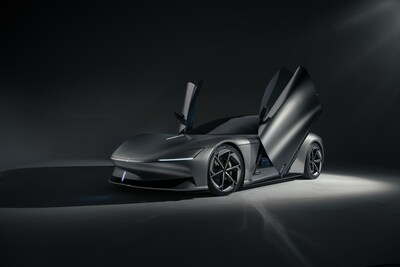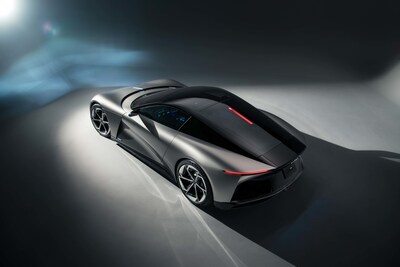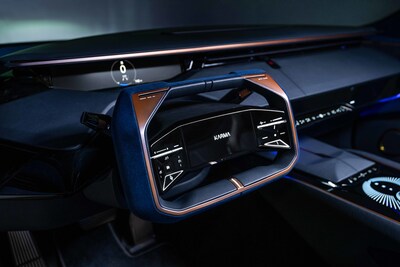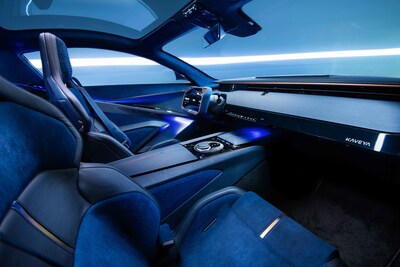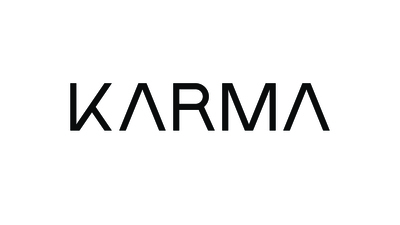Karma Automotive Announces Bilateral Collaboration with Intel Automotive to Blueprint the Future of the Automobile
Karma Automotive, California's ultra-luxury automaker, has announced a bilateral collaboration with Intel Automotive to co-develop Software Defined Vehicle Architecture (SDVA). This partnership aims to pioneer new technologies for the automotive industry, focusing on reducing costs and increasing efficiency. The collaboration will underpin Karma's upcoming vehicles, including the Karma Kaveya super coupe, set to launch in 2026.
SDVA represents a significant shift from traditional vehicle architecture, moving towards a centralized computing system that allows for flexible workload management and improved energy efficiency. This approach is expected to revolutionize the automotive industry, similar to how the IT industry transitioned to high-performance computing systems.
Karma Automotive, il produttore di automobili ultra-lusso della California, ha annunciato una collaborazione bilaterale con Intel Automotive per co-sviluppare l'Architettura dei Veicoli Definiti dal Software (SDVA). Questa partnership mira a pioniere nuove tecnologie per l'industria automobilistica, concentrandosi sulla riduzione dei costi e sull'aumento dell'efficienza. La collaborazione supporterà i futuri veicoli di Karma, incluso il Karma Kaveya super coupe, previsto per il lancio nel 2026.
La SDVA rappresenta un cambiamento significativo rispetto all'architettura tradizionale dei veicoli, spostandosi verso un sistema di calcolo centralizzato che consente una gestione flessibile dei carichi di lavoro e un miglioramento dell'efficienza energetica. Questo approccio è destinato a rivoluzionare l'industria automobilistica, simile a come l'industria IT è passata ai sistemi di calcolo ad alte prestazioni.
Karma Automotive, el fabricante de automóviles de ultra-lujo de California, ha anunciado una colaboración bilateral con Intel Automotive para co-desarrollar la Arquitectura de Vehículo Definida por Software (SDVA). Esta asociación tiene como objetivo pionear nuevas tecnologías para la industria automotriz, centrándose en la reducción de costos y el aumento de la eficiencia. La colaboración respaldará los próximos vehículos de Karma, incluyendo el Karma Kaveya super coupe, que se lanzará en 2026.
La SDVA representa un cambio significativo con respecto a la arquitectura de vehículos tradicionales, moviéndose hacia un sistema de computación centralizado que permite una gestión flexible de la carga de trabajo y una mejor eficiencia energética. Se espera que este enfoque revolucione la industria automotriz, de manera similar a cómo la industria de TI pasó a sistemas de computación de alto rendimiento.
캘리포니아의 초호화 자동차 제조업체인 카르마 오토모티브(Karma Automotive)는 인텔 오토모티브(Intel Automotive)와의 양자 협력을 발표하며 소프트웨어 정의 차량 아키텍처(SDVA)를 공동 개발하기로 했습니다. 이 파트너십은 자동차 산업을 위한 새로운 기술을 선도하는 것을 목표로 하며, 비용 절감과 효율성 증대에 중점을 두고 있습니다. 이 협력은 2026년에 출시될 예정인 카르마 카베야(Karma Kaveya) 슈퍼 쿠페를 포함한 카르마의 다가오는 차량을 뒷받침할 것입니다.
SDVA는 전통적인 차량 아키텍처에서 중요한 전환점을 나타내며, 중앙 집중식 컴퓨팅 시스템으로 나아가 유연한 작업 부하 관리 및 개선된 에너지 효율성을 가능하게 합니다. 이 접근 방식은 자동차 산업에 혁신을 가져올 것으로 기대되며, IT 산업이 고성능 컴퓨팅 시스템으로 전환한 방식과 유사합니다.
Karma Automotive, le constructeur automobile ultra-luxueux de Californie, a annoncé une collaboration bilatérale avec Intel Automotive pour co-développer l'Architecture de Véhicule Défini par Logiciel (SDVA). Ce partenariat vise à percer de nouvelles technologies pour l'industrie automobile, en se concentrant sur la réduction des coûts et l'augmentation de l'efficacité. La collaboration soutiendra les futurs véhicules de Karma, y compris le Karma Kaveya super coupé, prévu pour le lancement en 2026.
La SDVA représente un changement significatif par rapport à l'architecture traditionnelle des véhicules, se dirigeant vers un système informatique centralisé qui permet une gestion flexible de la charge de travail et une efficacité énergétique améliorée. Cette approche devrait révolutionner l'industrie automobile, tout comme l'industrie informatique est passée à des systèmes de calcul haute performance.
Karma Automotive, der Hersteller von Ultra-Luxusfahrzeugen in Kalifornien, hat eine bilaterale Zusammenarbeit mit Intel Automotive angekündigt, um die Software Defined Vehicle Architecture (SDVA) gemeinsam zu entwickeln. Diese Partnerschaft zielt darauf ab, neue Technologien für die Automobilindustrie zu entwickeln, mit einem Fokus auf Kostensenkung und Effizienzsteigerung. Die Zusammenarbeit wird die kommenden Fahrzeuge von Karma unterstützen, einschließlich des Karma Kaveya Super Coupés, das 2026 auf den Markt kommen soll.
SDVA stellt einen bedeutenden Wandel von der traditionellen Fahrzeugarchitektur dar und bewegt sich in Richtung eines zentralisierten Computersystems, das flexibles Lastmanagement und verbesserte Energieeffizienz ermöglicht. Dieser Ansatz wird voraussichtlich die Automobilindustrie revolutionieren, ähnlich wie die IT-Branche von Hochleistungsrechnern aufgerüstet wurde.
- Collaboration with Intel Automotive to develop advanced SDVA technology
- Potential to reduce costs and increase efficiency in vehicle manufacturing
- Karma Kaveya super coupe with up to 1,000 horsepower planned for 2026 launch
- Opportunity to provide B2B SDVA solutions to other OEMs and Tier 1 suppliers
- High price point of $300,000 USD for the Karma Kaveya may limit market reach
- Significant technological shift may pose implementation challenges
Insights
This collaboration between Karma Automotive and Intel Automotive marks a significant shift in the automotive industry towards Software Defined Vehicle Architecture (SDVA). The move to SDVA represents a paradigm shift from traditional vehicle design, potentially leading to more efficient, flexible and cost-effective vehicle systems.
The partnership aims to develop open standards for SDVA, which could accelerate industry-wide adoption and innovation. This approach mirrors the successful transition in the IT industry from single-function devices to centralized computing systems, suggesting potential for substantial improvements in vehicle performance and energy efficiency.
The planned implementation of SDVA in Karma's upcoming Kaveya super coupe serves as a real-world test bed for this technology, potentially setting a new standard for luxury electric vehicles. If successful, this could position Karma and Intel as leaders in next-generation automotive technology, influencing the entire industry's direction.
This collaboration has significant market implications. For Karma, it provides an opportunity to differentiate in the luxury EV market, potentially boosting its competitive position against established players. The partnership with Intel, a tech giant, lends credibility to Karma's technological ambitions.
For Intel, this move strengthens its position in the automotive semiconductor market, a sector projected for substantial growth as vehicles become more software-dependent. The development of open SDVA standards could also give Intel a strategic advantage in shaping future automotive technologies.
The broader impact on the automotive industry could be substantial. If SDVA proves successful, it could trigger a wave of innovation and restructuring across the supply chain, potentially disrupting traditional automotive suppliers while creating opportunities for tech-focused companies. This shift could accelerate the convergence of the automotive and tech industries, reshaping the competitive landscape.
While specific financial details are not disclosed, this collaboration could have significant long-term financial implications. For Karma, successful implementation of SDVA could lead to reduced production costs and improved margins, important for a niche luxury automaker. The potential to license SDVA solutions to other OEMs represents a new revenue stream, diversifying Karma's business model.
For Intel, expanding its footprint in the automotive sector could drive revenue growth as the market for automotive semiconductors expands. The development of open standards could also create a first-mover advantage, potentially leading to increased market share in this growing sector.
Investors should note that while the potential rewards are significant, they come with risks. The 2026 timeline for the Kaveya indicates a long development cycle and the success of SDVA in real-world applications remains to be proven. The
Through the Collaborative Development of Software-Defined Vehicle Architecture, the Companies will Pioneer and Prove New Technologies to Reduce Cost and Heighten Efficiency to the Benefit of the Entire Automotive Industry
"Karma Automotive, together with Intel Automotive, will realize SDVA's full potential to create innovative, intelligent and beautiful Karma automobiles which, in addition to delivering unparalleled driving dynamics, will be highly efficient and offer an exceptional ownership experience," says Marques McCammon, President, Karma Automotive. "For Tier 1's and OEMs (Original Equipment Manufacturers) not quite ready to take the leap from the old way of doing things to the new, Karma Automotive will play as an ally, helping them make that transition with business-to-business SDVA solutions in the same way we do today with Karma Connect, our proprietary Vehicle Data Management and Over the Air services platform, which presently provides services to the world's second largest OEM."
"As the leader of Intel Automotive, I come by my love of cars honestly, my family having owned everything from a Renault Le Car to a Porsche and an MBG. At Intel Automotive we can see that the industry is facing a perfect storm of unprecedented change. Intel has assisted other industries with such transformations in the past and we're honored to do the same in Automotive," says Jack Weast, Intel Fellow, Vice President, General Manager, Intel Automotive. "Together, through this collaboration with Karma Automotive, we're in a position to prepare the industry for the leap forward to SDVA without leaving anyone behind."
McCammon and Weast first aligned on the vision for the future of the automobile during their work as colleagues over a decade ago at Wind River, formerly a division of Intel.
The Karma Kaveya super coupe, with up to 1,000 horsepower, optional all-wheel drive and a sub-three second 0-60, will be priced from approximately
Software Defined Vehicle Architecture (SDVA): Technical Explanation & Background
Since the invention of the automobile in 1888, its architecture has remained relatively unchanged: powertrains have become more powerful and efficient, and vehicle safety has greatly improved, but the format has stayed largely the same. With the addition of each new feature from fuel injection and power windows to air-conditioning and Advanced Driver Assistance Systems (ADAS), today's vehicle typically has over 100 Electric Control Units (ECUs), each delivering a single function, requiring over a mile of copper cabling to connect. Layer upon layer has been piled atop a foundation which can no longer support the future of the automobile. The solution can be found in the Information Technology (IT) industry, which long ago moved away from single function devices to high-performance computing systems where multiple workloads run on a single, centralized system. Similarly, SDVA looks at the vehicle systems as a whole, and allows for the seamless movement of workloads between software-defined central "compute" systems and software-defined zonal "compute" sub-systems, ensuring maximum flexibility, optimal cost and performance with significant energy efficiency benefits.
As an example, many EVs – even when switched "off" – support a feature that still monitors the external cameras for security threats or to recognize the driver as they approach. Typically, this feature is supported on the vehicle's in-cabin "compute" subsystem, which due to its high-power consumption, puts unnecessary drain on the battery even when the vehicle is off. This workload doesn't have to stay resident on the software-defined central "compute" system. Using Intel's software-defined zonal controllers to handle camera streams, data center application orchestration concepts can be embraced and migrate the workload to a lower-power device (in this case the zonal controller) and wake the central compute system only when needed. It would save energy, improve efficiency and reduce the total number of electronic control units (ECUs) in the vehicle by consolidating workloads dynamically onto a software-defined zonal controller.
About Karma Automotive
Karma Automotive is
About Intel
Intel (Nasdaq: INTC) is an industry leader, creating world-changing technology that enables global progress and enriches lives. Inspired by Moore's Law, we continuously work to advance the design and manufacturing of semiconductors to help address our customers' greatest challenges. By embedding intelligence in the cloud, network, edge and every kind of computing device, we unleash the potential of data to transform business and society for the better. To learn more about Intel's innovations, go to newsroom.intel.com and intel.com.
© Intel Corporation. Intel, the Intel logo, and other Intel marks are trademarks of Intel Corporation or its subsidiaries. Other names and brands may be claimed as the property of others.
Media Contact:
Joe Richardson, (917) 716-6617
Joe@BeautifulNoisePR.com
![]() View original content to download multimedia:https://www.prnewswire.com/news-releases/karma-automotive-announces-bilateral-collaboration-with-intel-automotive-to-blueprint-the-future-of-the-automobile-302222156.html
View original content to download multimedia:https://www.prnewswire.com/news-releases/karma-automotive-announces-bilateral-collaboration-with-intel-automotive-to-blueprint-the-future-of-the-automobile-302222156.html
SOURCE Karma Automotive





